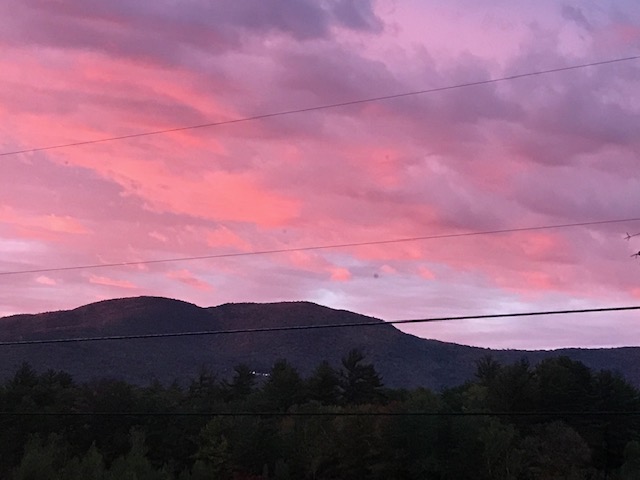Souls Unmasked
The sun has just risen over the hills in my view, lush after a day of rain. Its rays glaze the western flanks, stirring them to life briefly. Then, the brightness disappears behind a cloud bank, the gilded presence recedes, and once more, the hills are flatter, familiar, less compelling.
Something has been revealed. Something has been unmasked. Now, the moment passed, all we have is a lingering impression of something heretofore unseen — like a face behind a veil — that withdraws. We turn from our windows, back to our occupations and inner tape loops. Without the force of nature’s spotlight, much that we witness each day becomes mere background.
For more than a year, every man, woman and child on earth has lived behind a mask. On the surface at least, we have been hidden from one another, unable to touch, hug, entertain, work, learn, pray together. The most essential transactions have required the distance of six feet.
But if I carefully review the pages of this time, I see that, as on those fleetingly blazing hills, much has been revealed. Denied our usual social masks, with their roles and routines, we were thrust into the liminal space of our deepest realities. Like the children in India, who within a month of lockdown were able to see the Himalayas for the first time in their lives, thanks to the drastic drop in smog, so did we glimpse previously obscured goodness and value .
Make no mistake: We have lived through a cataclysm. A time punctuated by terror, massive loss of life, businesses, work, homes. But we who are here today are survivors. And every crisis requires those who survive to sift through the rubble to discern what it has to teach us for moving from grief and disorientation to a reality that has not yet come into being.
The in-between time of uncertainty and dwindling crisis appears to be coming to an end, with an acceleration that feels like psychological whiplash. Our masks are, we are told, no longer necessary. We can resume “normal” activities.
In these next few weeks, I want to pause and absorb what has changed within and around me. My expectations, my priorities, my sense of what is important and what must be let go. I want to examine the wholly unanticipated and undeserved gifts of a long season of hiddenness.
Last spring, like overwound and sugared-up children forced into an extended “time out” many of us collapsed into the full realization of our existential exhaustion. Had we really been so busy, so distracted, so insatiably restless, so bored? How had we lived that way for so long?
The relief at not having to bolt out the door seven days a week, to trains, appointments, offices, committee meetings, jockeying for parking spaces, standing in lines, enduring compulsory social events, was palpable.
We came face to face with the reality that our quality of life was not what we wanted, by a long shot.
The cluttered calendars we took for granted as essential to our happiness and well-being — the rounds of errands, exercise regimens at health clubs, the frequent trips to groceries, so much impulsive activity — were actually a juggling act we kept adding to, increasing our anxiety and accelerating our pace without delivering the fulfillment we longed for.
All of a sudden, less was more. There was more time in the morning to pray. Reading books became a viable pastime again. Playing board games. Walks at midday. Cooking with our kids.
We could afford the time to be curious again. More sensitive to the eyes, attitudes, and body language of those we saw on our walks. We’ve learned the birds in our neighborhoods, their songs and migration habits. We noticed the kitchen cupboards long ignored, and had unprecedented quantities of time for those closest to us.
Unbuffered by manic activity, unburdened of our purely operational ways of moving through our days (checking off our never-completed to-do lists), we began to see each other and the world around us more clearly. We rubbed shoulders with strangers from all walks of life in the clinics where we went for our vaccinations. We were stripped of any illusions that racial toxins have cleared our collective system and came face to face with the forces of hatred and resentment from those who feel, with reason, that they’ve been denied entry into American structures of “opportunity.”
We are told that we can remove our masks. That we can “return to normal.”
Lest we rush too quickly to close off these windows of revelation – into our collective ways and our collective blind spots – my prayer is that I am able to consider the real steps I might take to protect the values recovered in this time – simplicity sufficiency, generosity, empathy, intimacy, among them. And I want to find ways to harness an awakened appreciation for our interconnectedness and mutual dependence — to each other and to the earth. This is work that takes time and real thought – a different order of thought than merely ramping up to regain the old familiar, uncompelling schedules.
My prayer is that we don’t simply dash “back.” Doing so will be to regress to a status quo that is suboptimal for our spiritual lives, our relationships, the earth, and our world.
I am currently reading the remarkable story of Edith Eva Eger, a survivor of Auschwitz who became a therapist dedicated to helping sufferers of PTSD. Her book, The Choice, is a perfect companion for the moment that we are in.
Describing a turning point in her own journey of healing, she decided to travel to Israel and interview other survivors, in order to explore what one of her professors called the “calamity theory of growth.”
“Very often,” wrote this theorist, Richard Farson, “it is the crisis situation…that actually improves us as human beings. Paradoxically, while these incidents can sometimes ruin people, they are usually growth experiences. As a result of such calamities the person often makes a major reassessment of his life situation and changes it in ways that reflect a deeper understanding of his own capabilities, values, and goals.”
Eger is a guide into the difficult and painful work required for healing and change, and I am grateful to have found her. Taking off our masks will enable us to resume many of the routines we have missed. But doing the deeper work of holding our values will need continuing spaciousness, a “less is more” attitude, and quiet, meaningful conversation.
Namaste.





Elizabeth Rhymer
May 30, 2021at8:33 pmOh you write so well! I loved this piece and am contemplating these same things. Is it an amazing coincidence? Or do you also follow Pam Gregory? : I just got “The Choice” to read. I have missed a number of your pieces. The width of the words on a computer is daunting. This time I printed it out. Do you think there is a way to change the margins in how it shows up on screen?
Kathleen Hirsch
May 31, 2021at6:49 amElizabeth, thank you so much for writing! I always love to know that Freedom people are seeing my blog, so feel free to share as you see fit. I don’t know Pam Gregory! I’ll look into the margins issue — haven’t heard this being difficult from others, but perhaps it has been. Happy (almost) summer!
Perry Colmore
May 30, 2021at3:52 pmAh. Thank you Kathleen. I’m feeling a little bit like a friend who said she’s feeling like a dog who was let out of her crate and wanted to go right back in. You expressed the desire to move slowly, remembering the serene and learning parts of being locked down.
Kathleen Hirsch
May 30, 2021at4:37 pmI love the analogy, Perry! I think many of our crates have been welcome respites from the crazy lives we’d been living — crazy, as in: unexamined. With thanks to Mr. Thoreau and Socrates. Thanks for writing in…!
Sue Carman
May 30, 2021at8:50 amThank you, Kathleen, for putting your finger on the pulse of my racing heart. As you suggest, we need to preserve space for integrating the lessons learned during the pandemic.
Kathleen Hirsch
May 30, 2021at2:34 pmThanks, Sue. Yes, I feel we need to take care of ourselves in this way, lest we miss the treasures hidden in this time.
Nancy Rappaport
May 30, 2021at8:09 amSo apt as I feel a bit bewildered with the closure. I am reading Primo Levi the periodic table, he of course survived Auchwitz and had a tragic ending. I like what Bruce Perry calls post traumatic wisdom instead of growth . Emphasizing the reflection ( his book with Oprah Winfrey what happened to you is excellent on audible. Thank you for your words of encouragement .
Kathleen Hirsch
May 30, 2021at2:35 pmThanks, Nancy. Levi was a genius, and it’s hard to think of his demise after years of survival. Eger is quite remarkable, a very strong woman, and an inspiration.